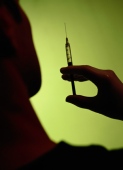
THURSDAY, Jan. 26 (HealthDay News) — The human papillomavirus (HPV) vaccine Gardasil does not trigger autoimmune disorders such as rheumatoid arthritis, lupus, type 1 diabetes or multiple sclerosis, according to a two-year study that included nearly 190,000 girls and women.
Gardasil is recommended in the United States for girls and young women to protect them against HPV infection, which is the most common sexually transmitted disease in the United States and can lead to cervical cancer. A second HPV vaccine, GlaxoSmithKline’s Cervarix, is also approved to prevent infection with the virus.
However, long-standing concerns that the HPV vaccine might trigger autoimmune reactions have led many parents to bar their children from receiving the three-dose vaccine, the study authors pointed out in a news release from Kaiser Permanente.
In the study, which was funded by Gardasil’s maker, Merck & Co., researchers analyzed the health records of almost 190,000 females aged 9 to 26 in California who were followed for six months after receiving each dose of Gardasil in 2006-2008.
The Kaiser Permanente researchers said that, compared to females who did not get the shot, vaccinated females did not have higher rates of 16 autoimmune conditions, including lupus, rheumatoid arthritis, Graves’ disease, multiple sclerosis, optic neuritis and others.
The study, led by Chun Chao, a research scientist at the Kaiser Permanente department of research and evaluation in Pasadena, Calif., is published in the February issue of the Journal of Internal Medicine.
One expert not connected with the study said the findings were reassuring.
“This study confirms what we had already believed to be true of this vaccine,” said Dr. Stephanie Blank, assistant professor in the department of obstetrics and gynecology and director of the gynecologic oncology fellowship at NYU Langone Medical Center in New York City. She believes that “the benefits of the HPV vaccine clearly outweigh the risks. The HPV vaccine gives us a great tool — a means to actually prevent cervical cancer.”
An expert in rheumatology agreed.
“This well-designed study looked at a large number of women who received the human papillomavirus vaccine. There did not appear to be an increased risk of developing autoimmune diseases in those vaccinated,” said Dr. Harry Fischer, chief of the division of rheumatology at Beth Israel Medical Center in New York City. “This article speaks to the safety of the vaccine and helps to confirm that it does not contribute to the development of autoimmune diseases,” he said.
More information
The U.S. Centers for Disease Control and Prevention has more about HPV vaccines.

